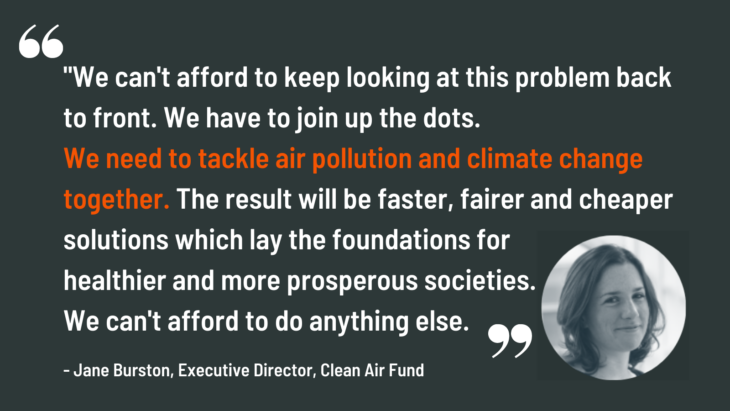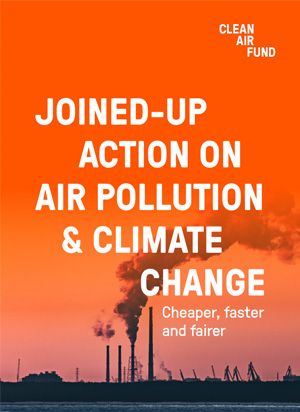Outdoor air pollution causes over 4.2 million deaths every year – more than malaria, tuberculosis and HIV/AIDS combined. Fossil-fuel combustion accounts for about two-thirds of human exposure to such air pollution, and is also the main driver of climate change. Yet decision-makers too often address them separately, overlooking the substantial co-benefits of joined-up action, and consequently judging powerful climate and air pollution interventions to be too costly.
The briefing paper, Joined-up Action on Air Pollution and Climate Change, finds that factoring in wider savings on healthcare, economic productivity and inequality reduction from tackling air pollution when deciding climate policies can support bolder, faster action on air pollution and climate change.
Taking into account air pollution benefits could lead to policy packages which increase emission reduction potential by up to 50%, while also offering a positive net return on overall investment. In the EU, for example, it is estimated that spending €38-40 billion a year to adopt all feasible measures to control both greenhouse gases and air pollution would generate up to €157 billion per annum in health benefits.
A joined up approach would avoid unintended consequences caused by blinkered policy-making such as governments encouraging the switch from petrol to diesel vehicles in the hope of reducing C02 emissions but in fact increasing nitrogen oxides (NOx), air pollutants that are toxic for humans. Or burning biomass instead of natural gas, leading to an increase in pollutants such as volatile organic compounds, solid PM, and carbon monoxide which are also harmful to health.
Of course carbon reduction is crucial, but it’s just one piece of the cost-benefit analysis governments need. Climate change and air pollution are both mainly caused by burning fossil fuels, so governments are missing a trick by treating them in isolation. When you tot up the wider benefits, different solutions emerge which are better for the planet, better for our health and better for economies. So tackling air pollution ticks the big boxes most voters care about.”
Jane Burston, Executive Director of the Clean Air Fund
The paper calls for governments meeting at COP 26 to take a number of steps to promote this kind of thinking in climate policy-making, including:
- Stop all new public investment into high carbon emitting and air polluting fossil fuels. Find out more about air pollution and funding.
- Instead commit additional new funding to support a just transition to clean air solutions which includes increasing support to low- and middle-income countries, and focusing funding on the communities that need it most.
- Make action on air pollution an explicit priority in climate action and sustainable development activities and reporting, to deliver higher returns for health, climate, equity, and the economy.
- Increase the overall share and amount of grant-based assistance for tackling air pollution within climate action and sustainable development programmes, particularly in lower-income countries where air pollution is an overlooked but an escalating emergency.
- An integrated approach that takes the following actions:
- Adopt a new Global Air Quality Convention – where global targets informed by WHO ambient air pollution guidelines can be agreed and reported against, shared regional approaches that cross geographical boundaries can be established, and global institutional mechanisms can be strengthened.
- Coordinated national action – national mechanisms are needed to support cross-sectoral coordination to embed health considerations and co-benefits across adaptation, mitigation, and sustainable development policy and programmes. At government level, new cross-departmental Air Quality Units should be created with responsibilities and powers across health, climate, energy, waste, agriculture and transport policy.
- Improve policy coherence and indicator alignment – across international climate, and sustainable development frameworks to better understand the linked challenges in an integrated manner, and capture multiple benefits that may arise. Improvements in tracking and reporting on spending and results provide data and evidence for costs and benefits of an integrated approach to emission control actions.

Joined-up action on climate and clean air provides benefits today, especially for the most vulnerable, while also avoiding the worst of tomorrow. Tackling air pollution can be a secret weapon in fighting climate change, by making public policies more effective and cost-efficient. Now is the right time for political leaders to use it, to achieve their climate commitments in a cheaper, faster and fairer way.
Gaurav Gupta and Jean-Charles Guinchard – Dalberg Advisors and joint report authors
